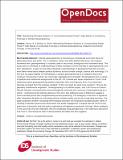| dc.contributor.author | Cairns, Rose | |
| dc.contributor.author | Stirling, Andrew | |
| dc.date.accessioned | 2014-07-25T14:39:34Z | |
| dc.date.available | 2014-07-25T14:39:34Z | |
| dc.date.issued | 2014-06-28 | |
| dc.identifier.citation | Cairns, R. & Stirling, A. (2014) ‘Maintaining Planetary Systems' or 'Concentrating Global Power'? High Stakes in Contending Framings of Climate Geoengineering. Global Environmental Change, vol.28, pp 25-38. | en_GB |
| dc.identifier.issn | 0959-3780 | |
| dc.identifier.uri | https://opendocs.ids.ac.uk/opendocs/handle/20.500.12413/4206 | |
| dc.description.abstract | ‘Climate geoengineering’ is becoming an increasingly prominent focus for global discussion and action. Yet, in academic, policy and wider political discourse, the frequent shorthand term ‘geoengineering’ is routinely used in very broad, ambiguous and multivalent ways. This study aims to contribute to understandings of these divergent current framings of ‘geoengineering’ and their implications. It asks not only about disparate understandings of geoengineering itself, but also what these reveal about deeper political dynamics around climate change, science and technology. To this end, the paper applies Q methodology to analyse geoengineering as a subjective discursive construct, the bounds of which are continually negotiated and contested. 35 participants from a variety of political and institutional backgrounds in the UK, US, Canada and Japan undertook a ‘Q sort’ of 48 statements about geoengineering between December 2012 and February 2013. Four distinctive framings emerged from this analysis, labelled: ‘At the very least we need more research’; ‘We are the planetary maintenance engineers’; ‘Geoengineering is a political project’; and ‘Let’s focus on Carbon.’ Results indicate a strong polarity around divergently-construed pros and cons of geoengineering as a whole – underscoring the political salience of this term. But additional axes of difference suggest a more nuanced picture than straightforward pro/anti positioning. The ambiguity of the term is argued to offer interpretive flexibility for articulating diverse interests within and across contending framings. The paper questions whether increasing terminological precision will necessarily facilitate greater clarity in resulting multivalent governance discussions and public engagement. It argues that the merits of any given form of precision and their policy implications will depend on particular framings. Much ambiguity in this area may thus be irreducible, with the challenges lying perhaps less in the ordering of discourse and more in reconciling the wider material political pluralities that this suggests. | en_GB |
| dc.description.sponsorship | ESRC | en_GB |
| dc.language.iso | en | en_GB |
| dc.publisher | Elsevier | en_GB |
| dc.rights | NOTICE: this is the author’s version of a work that was accepted for publication in Global Environmental Change. Changes resulting from the publishing process, such as peer review, editing, corrections, structural formatting, and other quality control mechanisms may not be reflected in this document. Changes may have been made to this work since it was submitted for publication. A definitive version was subsequently published in Global Environmental Change, 28, September 2014, DOI 10.1016/j.gloenvcha.2014.04.005 | en_GB |
| dc.rights.uri | http://www.ids.ac.uk/files/dmfile/IDSOpenDocsStandardTermsOfUse.pdf | en_GB |
| dc.subject | Climate Change | en_GB |
| dc.title | 'Maintaining Planetary Systems' or 'Concentrating Global Power'? High Stakes in Contending Framings of Climate Geoengineering | en_GB |
| dc.type | Article | en_GB |
| dc.rights.holder | Elsevier | en_GB |
| dc.identifier.externaluri | http://www.sciencedirect.com/science/article/pii/S0959378014000715 | en_GB |

